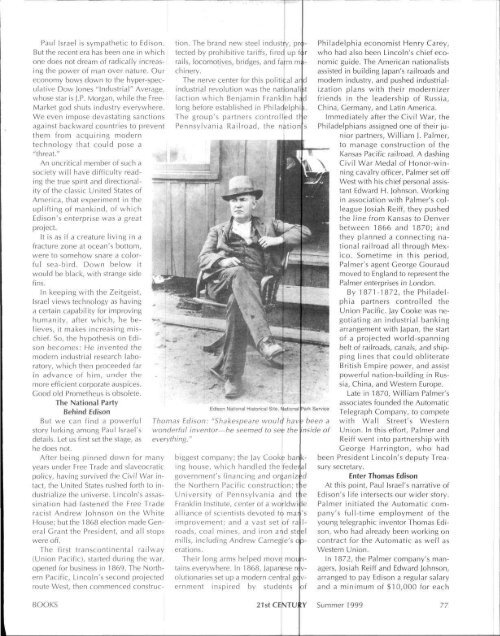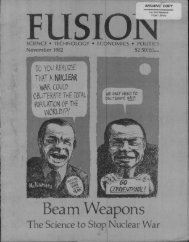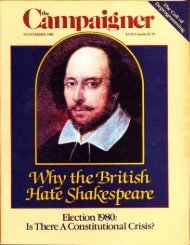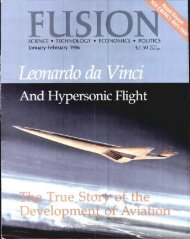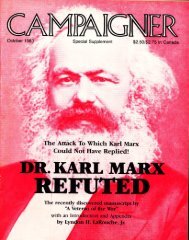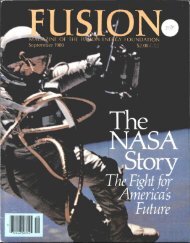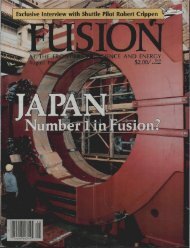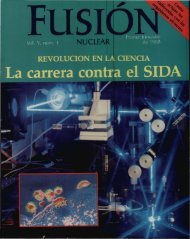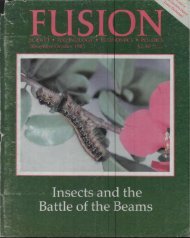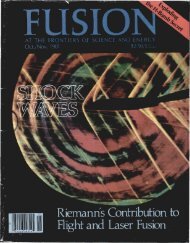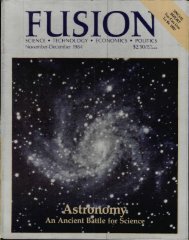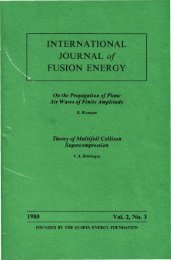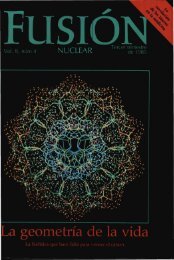Paul Israel is sympa<strong>the</strong>tic <strong>to</strong> Edison.But <strong>the</strong> recent era has been one in whichone does not dream of radically increasing<strong>the</strong> power of man over nature. Oureconomy bows down <strong>to</strong> <strong>the</strong> hyper-speculativeDow Jones "Industrial" Average,whose star is J.P. Morgan, while <strong>the</strong> Free-Market god shuts industry everywhere.We even impose devastating sanctionsagainst backward countries <strong>to</strong> prevent<strong>the</strong>m from acquiring moderntechnology that could pose a"threat."An uncritical member of such asociety will have difficulty reading<strong>the</strong> true spirit and directionalityof <strong>the</strong> classic United States ofAmerica, that experiment in <strong>the</strong>uplifting of mankind, of whichEdison's enterprise was a greatproject.It is as if a creature living in afracture zone at ocean's bot<strong>to</strong>m,were <strong>to</strong> somehow snare a colorfulsea-bird. Down below itwould be black, <strong>with</strong> strange sidefins.In keeping <strong>with</strong> <strong>the</strong> Zeitgeist,Israel views technology as havinga certain capability for improvinghumanity, after which, he believes,it makes increasing mischief.So, <strong>the</strong> hypo<strong>the</strong>sis on Edisonbecomes: He invented <strong>the</strong>modern industrial research labora<strong>to</strong>ry,which <strong>the</strong>n proceeded farin advance of him, under <strong>the</strong>more efficient corporate auspices.Good old Prome<strong>the</strong>us is obsolete.The National PartyBehind EdisonBut we can find a powerfuls<strong>to</strong>ry lurking among Paul Israel'sdetails. Let us first set <strong>the</strong> stage, ashe does not.After being pinned down for manyyears under Free Trade and slaveocraticpolicy, having survived <strong>the</strong> Civil War intact,<strong>the</strong> United States rushed forth <strong>to</strong> industrialize<strong>the</strong> universe. Lincoln's assassinationhad fastened <strong>the</strong> Free Traderacist Andrew Johnson on <strong>the</strong> WhiteHouse; but <strong>the</strong> 1868 election made GeneralGrant <strong>the</strong> President, and all s<strong>to</strong>pswere off.The first transcontinental railway(Union Pacific), started during <strong>the</strong> war,;opened for business in 1869. The Nor<strong>the</strong>rnPacific, Lincoln's second projectedroute West, <strong>the</strong>n commenced construc-tion. The brand new steel industry, protected by prohibitive tariffs, fired up forrails, locomotives, bridges, and farm m i-chinery.The nerve center for this political ar dindustrial revolution was <strong>the</strong> nationalistfaction which Benjamin Franklin F^dlong before established in Philadelphi i.The group's partners controlled tr ePennsylvania Railroad, <strong>the</strong> nationfsThomas Edison: "Shakespeare would hav ; been awonderful inven<strong>to</strong>r—he seemed <strong>to</strong> see <strong>the</strong> inside ofeverything."biggest company; <strong>the</strong> Jay Cooke bankinghouse, which handled <strong>the</strong> fedeialgovernment's financing and organiz ?d<strong>the</strong> Nor<strong>the</strong>rn Pacific construction; t leUniversity of Pennsylvania and tieFranklin Institute, center of a worldwi Jealliance of scientists devoted <strong>to</strong> mar 'simprovement; and a vast set of ra I-roads, coal mines, and iron and steelmills, including Andrew Carnegie's c 3-erations.Their long arms helped move mountainseverywhere. In 1868, Japanese r« v-olutionaries set up a modern central gc v-ernment inspired by students ofPhiladelphia economist Henry Carey,who had also been Lincoln's chief economicguide. The American nationalistsassisted in building Japan's railroads andmodern industry, and pushed industrializationplans <strong>with</strong> <strong>the</strong>ir modernizerfriends in <strong>the</strong> leadership of Russia,China, Germany, and Latin America.Immediately after <strong>the</strong> Civil War, <strong>the</strong>Philadelphians assigned one of <strong>the</strong>ir juniorpartners, William J. Palmer,<strong>to</strong> manage construction of <strong>the</strong>Kansas Pacific railroad. A dashingCivil War Medal of Honor-winningcavalry officer, Palmer set offWest <strong>with</strong> his chief personal assistantEdward H. Johnson. Workingin association <strong>with</strong> Palmer's colleagueJosiah Reiff, <strong>the</strong>y pushed<strong>the</strong> line from Kansas <strong>to</strong> Denverbetween 1866 and 1870; and<strong>the</strong>y planned a connecting nationalrailroad all through Mexico.Sometime in this period,Palmer's agent George Gouraudmoved <strong>to</strong> England <strong>to</strong> represent <strong>the</strong>Palmer enterprises in London.By 1871-1872, <strong>the</strong> Philadelphiapartners controlled <strong>the</strong>Union Pacific. Jay Cooke was negotiatingan industrial bankingarrangement <strong>with</strong> Japan, <strong>the</strong> star<strong>to</strong>f a projected world-spanningbelt of railroads, canals, and shippinglines that could obliterateBritish Empire power, and assistpowerful nation-building in Russia,China, and Western Europe.Late in 1870, William Palmer'sassociates founded <strong>the</strong> Au<strong>to</strong>maticTelegraph Company, <strong>to</strong> compete<strong>with</strong> Wall Street's WesternUnion. In this effort, Palmer andReiff went in<strong>to</strong> partnership <strong>with</strong>George Harring<strong>to</strong>n, who hadbeen President Lincoln's deputy Treasurysecretary.Enter Thomas EdisonAt this point, Paul Israel's narrative ofEdison's life intersects our wider s<strong>to</strong>ry.Palmer initiated <strong>the</strong> Au<strong>to</strong>matic company'sfull-time employment of <strong>the</strong>young telegraphic inven<strong>to</strong>r Thomas Edison,who had already been working oncontract for <strong>the</strong> Au<strong>to</strong>matic as well asWestern Union.In 1872, <strong>the</strong> Palmer company's managers,Josiah Reiff and Edward Johnson,arranged <strong>to</strong> pay Edison a regular salaryand a minimum of $10,000 for eachBOOKS21stCENTUItY Summer 1999 77
patent. The Palmer associates did everythingpossible <strong>to</strong> establish Edison, whosegenius <strong>the</strong>y recognized, as an independentinven<strong>to</strong>r. Palmer's agent GeorgeGouraud soon arranged <strong>to</strong> represent Edison'sinterests in Britain.Aside from identifying Johnson, Reiff,and Gouraud as associated <strong>with</strong> "railroadmagnate William Palmer," biographerIsrael gives us only <strong>the</strong> followinginformation on Edison's relationship <strong>to</strong><strong>the</strong>se sponsors: "Edison's . . . supportfor Republican politicians had [mainly]<strong>to</strong> do <strong>with</strong> <strong>the</strong> party's role in promotingpolicies favorable <strong>to</strong> industrial capitalism,particularly a protective tariff."Israel does note that Edison was an intensivereader of Thomas Paine's politicalwritings, as was Edison's revolutionaryrefugee fa<strong>the</strong>r. (He neglects <strong>to</strong>mention that Edison wrote <strong>the</strong> preface <strong>to</strong>an edition of Paine's works.)It is at this juncture that <strong>the</strong> bankinghouse of J.P. Morgan enters <strong>the</strong> picture,although Morgan does not directly intersect<strong>the</strong> Edison s<strong>to</strong>ry (or Israel's narrative)until <strong>the</strong> light and power projectsome years later.Morgan's Anti-nationalist SyndicateJ.P. Morgan and Company was originallyestablished in 1871 as Drexel, Morganand Company, located in Philadelphiaand New York. It was an extensionof Morgan's fa<strong>the</strong>r's London bank, assignedby. <strong>the</strong> British establishment <strong>to</strong> destroy<strong>the</strong> Philadelphia nationalists. Morgan'sfirm ran a smear campaign andfinancial warfare that in 1873 bankrupted<strong>the</strong> Jay Cooke banking house,consequently plunging <strong>the</strong> United Statesin<strong>to</strong> depression and gravely weakening<strong>the</strong> Philadelphians. An internationalBritish-led syndicate of Morgan and <strong>the</strong>Rothschilds <strong>the</strong>n gained control overU.S. government bond financing. WallStreet, <strong>the</strong> nest of London's U.S. partners,was fast becoming dicta<strong>to</strong>r ofAmerican politics, credit, and businesslife.The Morgan family's attitude <strong>to</strong>wardsAmerica's innovation and nation-buildingmay be gleaned from a letter fromJ.P. Morgan <strong>to</strong> his fa<strong>the</strong>r, Junius, April29, 1874:"I have come <strong>to</strong> <strong>the</strong> conclusion thatnei<strong>the</strong>r my firm nor myself will have anything<strong>to</strong> do, hereafter, directly or indirectly,<strong>with</strong> <strong>the</strong> negotiation of securitiesof any undertaking not entirely completed.. ." [quoted in Ron Chernow,Edward H. Johnson, Edison's businessmanager, from Philadelphia's politicalnationalist leadership group, led <strong>the</strong>1884 Edison coup against I. P. Morgan.The House of Morgan, New York: AtlanticMonthly Press, 1990, p. 37].Edison's RiseThe Philadelphians' George Barker,chief scientist for <strong>the</strong> Franklin Institute,was put in <strong>to</strong>uch <strong>with</strong> Edison during <strong>the</strong>Au<strong>to</strong>matic Telegraph days. ProfessorBarker invited Edison <strong>to</strong> demonstrate hiswork at <strong>the</strong> University of Pennsylvaniaand <strong>the</strong> National Academy of Sciences,which <strong>the</strong> Philadelphia grouping hadfounded during <strong>the</strong> Civil War.From <strong>the</strong>n on, <strong>the</strong> Philadelphiansboosted Edison <strong>to</strong>wards fame and success;Paul Israel documents much of this,although abstracted from its broadercontext.Ed Johnson oversaw Edison's telephonedevelopment, in which Edison'scarbon transmitter transformed AlexanderGraham Bell's ineffective instrumentin<strong>to</strong> a commercial technology. ProfessorBarker made Edison famous at a NationalAcademy of Sciences speech deliveredby <strong>the</strong> phonograph, Edison's new invention,and <strong>with</strong> Washing<strong>to</strong>n demonstrationsarranged by <strong>the</strong> nationalist faction.Ed Johnson managed <strong>the</strong> early Edisonphonograph company.The light project began soon afterwards,when Edison went out West on anastronomy excursion <strong>with</strong> Barker. Theprofessor reviewed <strong>the</strong> evolution of electricalscience, and <strong>the</strong> recent attempts <strong>to</strong>create light from electricity, and proposedthat Edison take this up as his owngreat project. Barker next <strong>to</strong>ok Edison <strong>to</strong>Connecticut <strong>to</strong> view an arc light and aprimitive genera<strong>to</strong>r installation. Seeing aproblem posed, and that no one was on<strong>the</strong> track <strong>to</strong> a solution, Edison excitedly<strong>to</strong>ok up <strong>the</strong> challenge. A month later,Edison <strong>to</strong>ld <strong>the</strong> newspapers he had "invented<strong>the</strong> electric light," and would supplylight and power <strong>to</strong> <strong>the</strong> dark world.It was <strong>the</strong>n that J.P. Morgan moved in<strong>to</strong> try <strong>to</strong> exercise control, and because ofMorgan's increasing domination of <strong>the</strong>nation's credit, Edison was forced <strong>to</strong> deal<strong>with</strong> him. He constantly jousted <strong>with</strong>Morgan, <strong>with</strong> <strong>the</strong> (now financiallyweaker) Palmer group behind him andin his management. Only a fragment of<strong>the</strong>se formative developments are in <strong>the</strong>Paul Israel biography, but his treatmen<strong>to</strong>f <strong>the</strong> initiative from this point on hasbroad interest.We learn that young men worked forEdison for little or nothing, for <strong>the</strong>chance <strong>to</strong> learn, and many would bewilling <strong>to</strong> pay for <strong>the</strong> privilege; Edisonset up an electrical engineering school<strong>with</strong>in <strong>the</strong> enterprise. Israel describes indepth <strong>the</strong> invention of <strong>the</strong> electrical industry,<strong>with</strong> teams of sub-inven<strong>to</strong>rs in asmall group of companies and shops.Edison constantly drew down profits<strong>to</strong> advance development, as he and hismen learned <strong>to</strong> tame current.Ed Johnson went <strong>to</strong> London and established<strong>the</strong> first commercial central stationin <strong>the</strong> world, <strong>the</strong> Holborn Viaduct.Johnson exhibited Edison's work at <strong>the</strong>London Crystal Palace Exhibition inspring 1882. The London Daily News reported:"His exhibition is <strong>the</strong> wonder of<strong>the</strong> show. . . . There is but one Edisonand Johnson is his prophet."Israel's biography shows that SamuelInsull, who was <strong>to</strong> pioneer <strong>the</strong> creation ofEdison's electric utilities, was recruitedin<strong>to</strong> <strong>the</strong> Edison organization by <strong>the</strong>Philadelphians Gouraud and Johnson inLondon. And that Frank Sprague, whowould engineer <strong>the</strong> large electric installations,worked first for Ed Johnson. Johnsonwas later president of Sprague's owncompany, introducing America's electriceleva<strong>to</strong>rs, streetcars, and subways.Morgan Applies <strong>the</strong> BrakesWhen Edison successfully started up<strong>the</strong> Pearl Street, New York, centralpower station, J.P. Morgan let it beknown that <strong>the</strong>re would be no more suchstations built.An 1883 report of <strong>the</strong> Edison ElectricLight Company, written by Morgan rep-78 Summer 1999 21st CENTURY BOOKS


